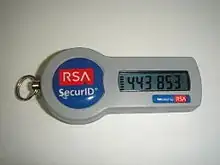
My workplace uses these things to generate one-time passwords which only work within a short time period. I have always been curious about how the clock synchronisation between the authentication server and the token might work. I'm not sure whether there is any communication between the token and the outside world at all, but I would doubt it because they are small, light, and they must make these things to be as cheap as possible for lowest unit cost. So, maybe there isn't any synchronization at all? But then, wouldn't the clocks gradually drift apart, especially if the battery was running down, eventually resulting in a bricked token?